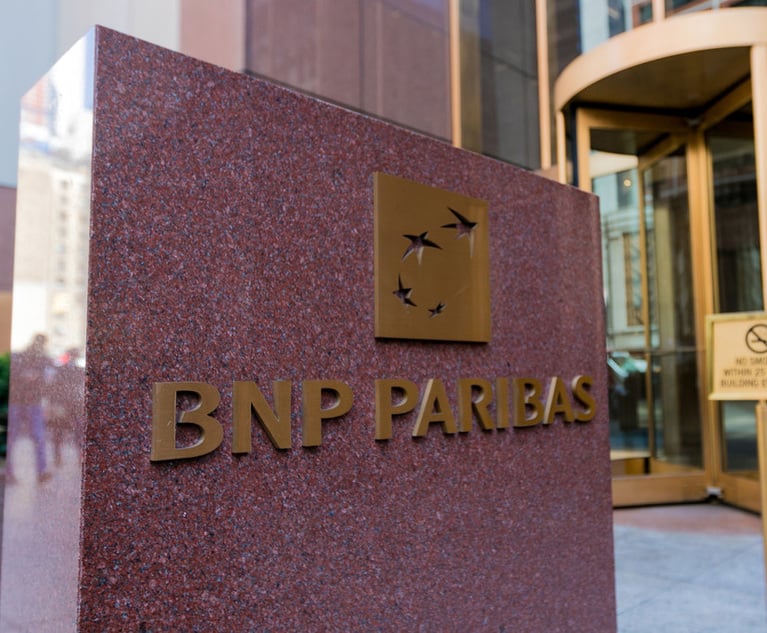Loan Modifications and Lender Liability In the Era of Covid-19
In their Real Estate Financing column, Jeffrey Steiner and Scott Weinberg write: In the current economic climate, created in large part by the Covid-19 virus, many borrowers are facing challenges and approaching their lenders with loan modification requests. In handling the large number of such requests, it is important for lenders and servicers to remember to exercise caution in their communications with these borrowers to avoid potential liability for negligence.
May 19, 2020 at 01:18 PM
7 minute read
 Jeffrey B. Steiner and Scott A. Weinberg
Jeffrey B. Steiner and Scott A. Weinberg
In the current economic climate, created in large part by the Covid-19 virus, many borrowers are facing economic, logistical and institutional challenges and approaching their lenders with loan modification requests. Therefore, in handling the large number of such requests, it is important for lenders and servicers to remember to exercise caution in their communications with these borrowers in order to avoid potential liability for negligence and/or negligent misrepresentation.
'Weimer'
A recent California case, although arising in the residential context, serves as a reminder to all lenders and servicers. In Weimer v. Nationstar Mortg., 2020 WL 1610159 (Cal. Ct. App. Apr. 2, 2020), the California Court of Appeals recently held servicers liable for negligence and negligent misrepresentation as a result of their mishandling of a borrower's loan modification applications and communications made in connection therewith.
In this case, the servicers lost the borrower's financial documents, falsely stated that the borrower would be granted a loan modification, failed to inform the borrower of the documents that were needed for review, and misrepresented that the borrower was eligible for a Home Affordable Modification Program loan modification when it was clear that the borrower could never have qualified for one. The court concluded that the servicers owed a duty of care to the borrower due to the "special relationship" that existed between them, which serves as an exception to the "economic loss" rule that would typically prohibit tort recovery in the absence of physical injury. In determining that the special relationship existed between the borrower and the servicer, the court applied a six-factor test.[1]
'Picini'
A similar exception exists in New York, where lenders and/or servicers can be held liable for negligent misrepresentation if they are found to have a "special relationship" with their borrowers. Although, as the court stated in Picini v. Chase Home Finance LLC, 854 F. Supp. 2d 266 (E.D.N.Y. 2012), "a typical borrower-lender relationship will not support a negligent misrepresentation claim," New York courts have imposed a duty of care on lenders and servicers, even in a commercial setting, when such a "special relationship" is found to exist.
In Picini, the lender's representatives, including a manager from the lender's resolution group, gave the borrower conflicting information regarding both lender's promise to pause an existing foreclosure proceedings if the borrower enrolled in a three-month temporary payment plan, and lender's willingness to provide a permanent home mortgage loan modification after the expiration of such temporary payment plan. The court allowed the borrower's negligent misrepresentation claim to survive dismissal because the borrower adequately alleged that a "special relationship" existed due to the lender's "special expertise" and "sophisticated understanding of servicing mortgage loans and of available loss mitigation options."
'Kimmel'
In Kimmell v. Shaefer, 89 N.Y. 2d 257 (1996), the New York Court of Appeals stated that "liability for negligent misrepresentation has been imposed only on those persons who possess unique or specialized expertise, or who are in a special position of confidence and trust with the injured party such that reliance on the negligent misrepresentation is justified."
The Kimmell court went on to describe the factors that a court will consider in determining whether such a "special relationship" exists, namely "whether the person making the representation held or appeared to hold unique or special expertise; whether a special relationship of trust or confidence existed between the parties; and whether the speaker was aware of the use to which the information would be put and supplied it for that purpose."
'Fleet Bank'
In Fleet Bank v. Pine Knoll Corp., 290 A.D.2d 792 (N.Y. App. Div. 2002), the court, applying the principles of the Kimmell court in a commercial context, found that a borrower's negligent misrepresentation claim could survive summary judgment where the defendant relied on her lender's advice in connection with a two-phase loan to be used for the acquisition, renovation and operation of commercial property. The borrower could not complete the project without obtaining both phases of funding, and although the lender's relationship managers promised that the second round of funding was forthcoming and encouraged the borrower to use personal assets to pay debts in the interim, the second round of funding never came and the project fell apart.
The court placed great weight on certain admissions made by a senior vice-president in his deposition where he stated that "a lot of small business customers are not financiers. …They rely heavily upon their relationship managers to provide them with… financial solutions. …By providing a customer with inaccurate information,… you could put them in a very bad position. …We need to be very careful in how we advise these people."
Similarly, the Picini court also paid close attention to the existence and actions of relationship managers assigned to assist the borrowers through loan modification applications. Thus, lenders and servicers should take extra care to ensure that their representatives, and especially any relationship managers they employ, do not give any bad or conflicting advice to their borrowers or make any promises that they do not intend to keep.
Other Jurisdictions
Other jurisdictions take different approaches to this issue. For example, no "special relationship" is required to plead negligent misrepresentation in New Jersey, as evidenced by the District Court's decisions in Prudential Ins. Co. of Am. v. Goldman, Sachs & Co., 2013 U.S. Dist. LEXIS 50788 (D. N.J. Apr. 9, 2013) and Bank of Am. N.A. v. Westheimer, 2014 U.S. Dist. LEXIS 25642 (D. N.J. Feb. 28, 2014). The Prudential court held that "the 'special relationship' element does not exist" in New Jersey, and the Bank of Am. court delineated the elements of a cause of action for negligent misrepresentation which noticeably omitted any "special relationship" requirement. New Jersey courts have been inconsistent on this issue though, as the court's decision in Cevdet Askut Ve Ogullari Koll. Sti. v. Cavusoglu, 2015 U.S. Dist. LEXIS 90859 (D. N.J. July 14, 2015), illustrates. In that case, the court stated that a "special relationship" is an element in a negligent misrepresentation claim.
Indeed, while it is more likely for a court to permit a negligent misrepresentation claim to proceed when brought by a residential borrower, at least one court in New York has found that a "special relationship" could exist between a commercial borrower and its lender. Although it may appear that a more sophisticated commercial real estate developer would be less successful in prosecuting a negligent misrepresentation claim, it would be prudent for all lenders and servicers to be aware of the "special relationship" exception and take precautions to avoid mishandling loan modification applications, misrepresenting facts to their borrowers or otherwise engaging in bad faith as they navigate the many loan modification negotiations that are occurring in this post-COVID-19 economy.
ENDNOTES:
[1] The six factors are as follows: "(1) the extent to which the transaction was intended to affect the plaintiff, (2) the foreseeability of harm to the plaintiff, (3) the degree of certainty that the plaintiff suffered injury, (4) the closeness of the connection between the defendant's conduct and the injury suffered, (5) the moral blame attached to the defendant's conduct, and (6) the policy of preventing future harm."
Jeffrey B. Steiner and Scott A. Weinberg are partners at McDermott Will & Emery. John Bauco and Sean Thorsen, associates at the firm, assisted in the preparation of this article.
This content has been archived. It is available through our partners, LexisNexis® and Bloomberg Law.
To view this content, please continue to their sites.
Not a Lexis Subscriber?
Subscribe Now
Not a Bloomberg Law Subscriber?
Subscribe Now
NOT FOR REPRINT
© 2025 ALM Global, LLC, All Rights Reserved. Request academic re-use from www.copyright.com. All other uses, submit a request to [email protected]. For more information visit Asset & Logo Licensing.
You Might Like
View All
The CFPB Is Digging In for Last Days of Biden's Term. But What Happens Next?
6 minute read

NY AG James Targets Crypto Fraud Which Allegedly Ensnared Victims With Fake Jobs
4 minute read
'Merciless' Filing Deadline Dooms Cuban Americans' Property-Trafficking Suit Against BNP Paribas, SocGen
4 minute readLaw Firms Mentioned
Trending Stories
- 1Decision of the Day: Judge Dismisses Defamation Suit by New York Philharmonic Oboist Accused of Sexual Misconduct
- 2California Court Denies Apple's Motion to Strike Allegations in Gender Bias Class Action
- 3US DOJ Threatens to Prosecute Local Officials Who Don't Aid Immigration Enforcement
- 4Kirkland Is Entering a New Market. Will Its Rates Get a Warm Welcome?
- 5African Law Firm Investigated Over ‘AI-Generated’ Case References
Who Got The Work
J. Brugh Lower of Gibbons has entered an appearance for industrial equipment supplier Devco Corporation in a pending trademark infringement lawsuit. The suit, accusing the defendant of selling knock-off Graco products, was filed Dec. 18 in New Jersey District Court by Rivkin Radler on behalf of Graco Inc. and Graco Minnesota. The case, assigned to U.S. District Judge Zahid N. Quraishi, is 3:24-cv-11294, Graco Inc. et al v. Devco Corporation.
Who Got The Work
Rebecca Maller-Stein and Kent A. Yalowitz of Arnold & Porter Kaye Scholer have entered their appearances for Hanaco Venture Capital and its executives, Lior Prosor and David Frankel, in a pending securities lawsuit. The action, filed on Dec. 24 in New York Southern District Court by Zell, Aron & Co. on behalf of Goldeneye Advisors, accuses the defendants of negligently and fraudulently managing the plaintiff's $1 million investment. The case, assigned to U.S. District Judge Vernon S. Broderick, is 1:24-cv-09918, Goldeneye Advisors, LLC v. Hanaco Venture Capital, Ltd. et al.
Who Got The Work
Attorneys from A&O Shearman has stepped in as defense counsel for Toronto-Dominion Bank and other defendants in a pending securities class action. The suit, filed Dec. 11 in New York Southern District Court by Bleichmar Fonti & Auld, accuses the defendants of concealing the bank's 'pervasive' deficiencies in regards to its compliance with the Bank Secrecy Act and the quality of its anti-money laundering controls. The case, assigned to U.S. District Judge Arun Subramanian, is 1:24-cv-09445, Gonzalez v. The Toronto-Dominion Bank et al.
Who Got The Work
Crown Castle International, a Pennsylvania company providing shared communications infrastructure, has turned to Luke D. Wolf of Gordon Rees Scully Mansukhani to fend off a pending breach-of-contract lawsuit. The court action, filed Nov. 25 in Michigan Eastern District Court by Hooper Hathaway PC on behalf of The Town Residences LLC, accuses Crown Castle of failing to transfer approximately $30,000 in utility payments from T-Mobile in breach of a roof-top lease and assignment agreement. The case, assigned to U.S. District Judge Susan K. Declercq, is 2:24-cv-13131, The Town Residences LLC v. T-Mobile US, Inc. et al.
Who Got The Work
Wilfred P. Coronato and Daniel M. Schwartz of McCarter & English have stepped in as defense counsel to Electrolux Home Products Inc. in a pending product liability lawsuit. The court action, filed Nov. 26 in New York Eastern District Court by Poulos Lopiccolo PC and Nagel Rice LLP on behalf of David Stern, alleges that the defendant's refrigerators’ drawers and shelving repeatedly break and fall apart within months after purchase. The case, assigned to U.S. District Judge Joan M. Azrack, is 2:24-cv-08204, Stern v. Electrolux Home Products, Inc.
Featured Firms
Law Offices of Gary Martin Hays & Associates, P.C.
(470) 294-1674
Law Offices of Mark E. Salomone
(857) 444-6468
Smith & Hassler
(713) 739-1250






